
32 minute read
Global Report
For the urban, middle class people of Russia, the war on Ukraine has altered plans, ruined longed-for holidays and stripped away everyday pleasures like shopping for a favourite foreign clothing brand, turning the key in a new Japanese car, or even munching into a Big Mac.
As the war drags on, now well past 100 days and unlikely to see any semblance of a solution before the end of the year, many people yearn for life to go back to normal, before prices went crazy and foreign companies quit the country over Russia’s invasion. But these Russians are equally sure that President Vladimir Putin will keep on ghting until he wins, because that’s what he always does.
Advertisement
After convincing the majority of the population that the war was necessary to ‘liberate’ Ukrainians from ‘Nazis’, State television propagandists are now doggedly preparing Russians for a long war, ominously warning that it might end in nuclear war.
In Ukraine, that means more civilian casualties, bombed houses and dozens of soldiers killed daily defending the country’s east.
Russian hardships may be trivial by contrast, but the deadening gloom of a long war worries the Kremlin, according to analysts, because of the challenge of dragging the population along as sanctions bite, businesses retrench, prices continue to surge, and it dawns on people that life may never go back to the way it was.
But the old Kremlin playbook, accusing the West of plans to gobble up Russia, is working so far. Denis Volkov of independent polling agency LevadaCenter said the latest polling for April showed almost half of Russians unconditionally support the war and about 30% support it with reservations, with 19% opposed. Many in focus groups saw it as an existential confrontation with the West, not Ukraine.
“People explain that a signi cant part of the world is against us and it’s only Putin who hopes to hold onto Russia, otherwise we would be eaten up completely. To them it is Russia that is defending itself,” he said. e con ict, however, is taking a toll on Russians like Marina, 57, a language teacher, whose friends are so weary of the war, they avoid the topic. She succeeded in changing the minds of a few friends and relatives who supported the war. “But in general, it seems everyone is sick and tired of the war or special operation. People have their own problems and the main problem is survival, especially with the rising prices.”
Marina acknowledged that few Russians are opposed to the war and most are nding a way to “get by somehow”. But she said: “ is ‘somehow’ is becoming boring. Most people got tired of it. I want to travel. Others want to be able to plan. We want to get back to our ordinary lives.”
Marina can’t help dreaming wistfully of her old life — just a few months ago. “I want to be able to watch Western movies on Net ix and shop at Uniqlo. I want to travel to Europe on affordable and reliable airlines. I want to be part of the world and not an outcast,” she said.
Many people, still in denial, are struggling to adapt, said Grigory Yudin, Professor of Political Philosophy at the Moscow School of Social and Economic Sciences. “ e natural question for Russians is not whether I support it or not — nobody asks you, actually — but how do I adapt to this?”
People want certainty about their incomes, travel plans and mortgages. Part of the Moscow elite, including middle-ranking bureaucrats who feel they are Europeans, are not happy about the war, he said, but tend to believe Putin will ght until he wins.
“I think the majority of Russians still honestly believe that this is going on with military success, or at least this is what people want to believe,” Yudin said. He added: “ e moreeducated people who are more informed and tend to consume information from di erent sources are not that certain about that. ey have signi cant doubts.”
Volkov said the latest polling showed interest in watching news about the war is beginning to wane, with people in focus groups wishing their lives could go back to the way they were.
“ e best scenario is for this to end as soon as possible and then we hope things will go back to normal,” said Ksenia, 50, a bookkeeper at a rm that sells foreign materials and has been hard hit by Western sanctions.
Most of her work colleagues began strongly supporting the war, but lately they avoid the subject, except to complain that ordinary people in Russia always pay the price of government decisions.
“My colleagues have nally started to realise that things are not great. In general, we try not to discuss it because we start to ght. ey’re saying, ‘We didn’t start this war and now we have to pay.’”
Her plan to holiday in Italy this summer is ruined because she cannot get a visa.
“Now I feel as if there’s no future and it’s very depressing.” She ached when McDonalds’ golden arches were removed not for any love of the burgers or fries, but for the idea it represented.
“I’m really upset about McDonald’s, and I really mean it. McDonald’s has always been a symbol of freedom for me. I remember when the rst McDonald’s opened in Moscow,” she said recalling the queues in 1990s months before the Soviet Union collapsed. “It felt like the light at the end of the tunnel.”
* News agency services
Russians miss their Big Mac but still support Putin’s war
Some light at the end of the gun law tunnel
Leading US senators senators have said there is growing momentum to forge a bipartisan congressional response to recent mass shootings that could toughen federal gun laws for the rst time in a generation.
But a deal was not yet in hand, they warned, and the delicate talks were expected to continue for several more days as negotiators seek to garner enough Republican support to get a compromise bill through the Senate.
Should an agreement come together, it is certain to fall well short of the parameters that President Biden laid out in his White House address, when he called for renewing the federal assault weapons ban that expired in 2004, as keen discussion, as do measures tackling school security and mental health, according to people involved in the discussions.
“It’s really tough sledding. But I’ve never been part of conversations that are this serious and this thoughtful before, and I know all the Republicans and Democrats who are at the table are there with total sincerity to get an agreement,” Senator. Chris Murphy (Conn.), the tough and determine Democratic negotiator, said.
Sen. Patrick J. Toomey (RPa.), another member of the small group of senators hashing out a potential deal, said on CBS’s Face e Nation that the discussions, while “intensive,” do not “guarantee any outcome. But it feels to me like we are closer than we’ve been since I’ve been in the Senate”.
Toomey co-led a failed 2013 e ort to expand criminal background checks for gun buyers after the Sandy Hook Elementary School shooting. e negotiators — and Democratic leaders — have seized on a growing sense of national outrage following the May 14 attack that took 10 lives at a Bu alo supermarket and the May 24 massacre of 19 children and two teachers inside Robb Elementary School in Uvalde, Tex. Other shootings with multiple victims have followed, including incidents in Tulsa; Ames, Iowa; Philadelphia and Chattanooga, Tennesse.

Art Summer Camps full day!
Art It is a wonderful airy space at MacDonagh Shopping Centre run by artist DiDi Dobree-Wilson that o ers ever changing and exciting summer camps for 5 to 13 year old children. ey are always stimulating, educative and fun, and often include other activities such as sewing, cooking, crystal art, string painting and much more. e age 5 to 7 camps run in the morning 10 am- 1 pm. For the 8 to13 year children, bring a packed lunch for a full day’s entertainment. Art It also o ers a walk-in experience for all ages. You can have fun painting pottery, glass, a canvas, a papier Mache piece, experimenting decoupage, or enamelling a piece of jewellery, by yourself, with your friends or with your family. During the year children enjoy oil and acrylic painting classes, and of course, the fun Saturday afternoon class. Children’s birthday parties and hen parties are great craic! Visit our website page www.artit.ie or call us at 086 3085270.

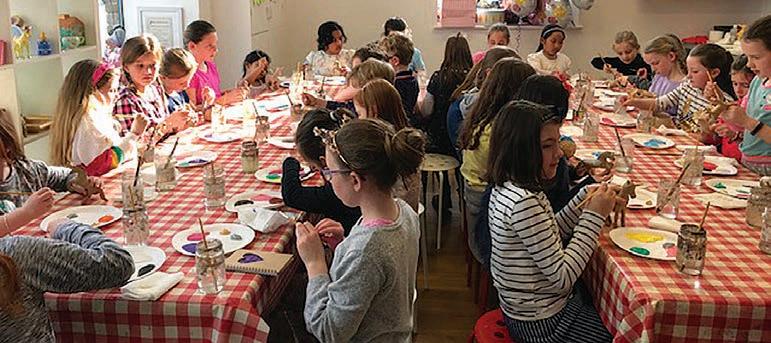




Summer days days Summer days are here

Longer evenings and warmer weather…we all know what that means – Summer has finally arrived!. Having a summer holiday booked gives us something to look forward to, but it can also take a lot of planning to ensure we enjoy every minute of it! We’re here to help you with one small but very important detail, packing your suitcase! If you’re spending your holiday relaxing at the beach or by the pool, swimwear is a must have. River Island have a variety of colourful prints and styles to choose from. Complete your look with a sunhat and accessories from TK Maxx. Ready to glam it up and enjoy a nice dinner and drinks? The Emporium Plisse jumpsuit from Pamela Scott is a comfy yet stylish night-time outfit or how about a nice flowy dress from Carraig Donn. Take any outfit from day to night with these sandals from Skechers. Last but certainly not least , keep your skin hydrated and protected from the sun with a selection of sunscreens available at Boots.

For more inspiration follow MacDonagh Junction Shopping Centre on Facebook and Instagram.

p TK Maxx €6.99





* All prices correct at time of print

Skechers €70 u
t Pamela Scott €49.99 t TK Maxx €19.99


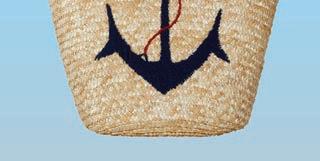


t Carraig Donn €46.95
p Boots €11
t River Island €50
River Island €20 q



Bundoran ready to embrace staycationers


From the famous Fairy Bridges to the stunning Tullan Strand to being the surf capital of Ireland, Bundoran, County Donegal is the ultimate family destination this summer for your staycation! Nestled in the southern most tip of Donegal, beautiful bracing Bundoran by the sea has become synonymous with its tradition of hospitality right across the seaside resort for many centuries.
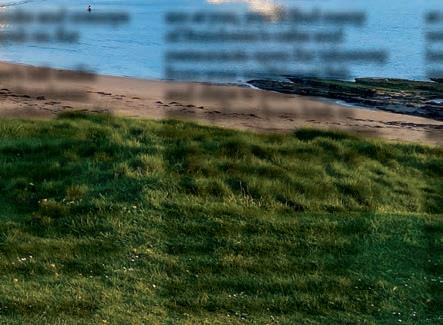
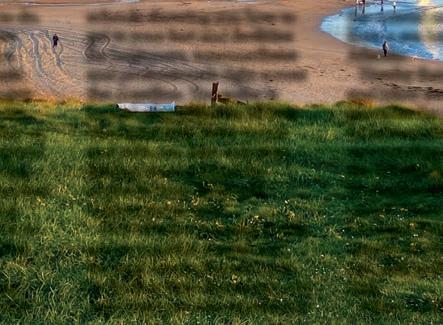
Enjoying stunning views of Donegal Bay, the rst stop in the county on the Wild Atlantic Way has something for the whole family who are looking to ll every moment or that someone who just wants to relax and let the world go by. Five hotels, numerous self catering apartments and holiday homes, B&Bs and hostels ensure that every budget is catered for while attractions and entertainment options won’t leave you wanting for something to do. Check out our impressive Fairy Bridges and make a wish on the Wishing Chair. Enjoy a stroll on the Rougey Walk and embrace that sea air. Settle down for the day on our Blue Flag beach or spend the afternoon experiencing the fun of the fair at Bundoran Adventure Park including the View Wheel lifting you to a height of 36 metres above ground.
For the sports enthusiast there’s sur ng with our surf schools showing you how to get to your feet and facilities for beginners, intermediates and professionals right across the coastline. e golfer is looked after with our 18 hole championship links course and with sea, lake and river shing close at hand the angler in your life is well catered for as well!
How about a horseback ride across a golden strand and through sandy dunes? Look no further than Bundoran. On calm days you can experience the coastal nooks and crannys from a sea kayak on the Atlantic.
Nearby there’s hill walks and hikes and Bundoran provides the perfect base for an adventure to explore the surrounding areas including the Gleni Horseshoe, Mullaghmore, Ireland’s Oldest Town – Ballyshannon, Donegal Town and further west to the highest accessible sea cli s in Europe – Sliabh Liag.
When the hunger pangs are at you, you’ll nd many of Bundoran’s cafes and restaurants open for takeaway from your traditional sh and chips to your full dinner with options from Irish to European, Chinese to Indian. Many will have outdoor dining in place this year too.
Finally, end your day with a loved one and take in one of Donegal’s stunning sunsets across Donegal Bay. Want to check it out before you get here? See our brand new webcams streaming live 24/7 at discoverbundoran.com/ webcam and when you get here, we’ve made it even easier for you to upload that treasured photo memory with free wi at our Main Beach and Tourist O ce. ings will be a little di erent this year and some things may be subject to change, but we are gearing up this year to give you a staycation to remember – for more see www.discoverbundoran.com and check us out on social media.

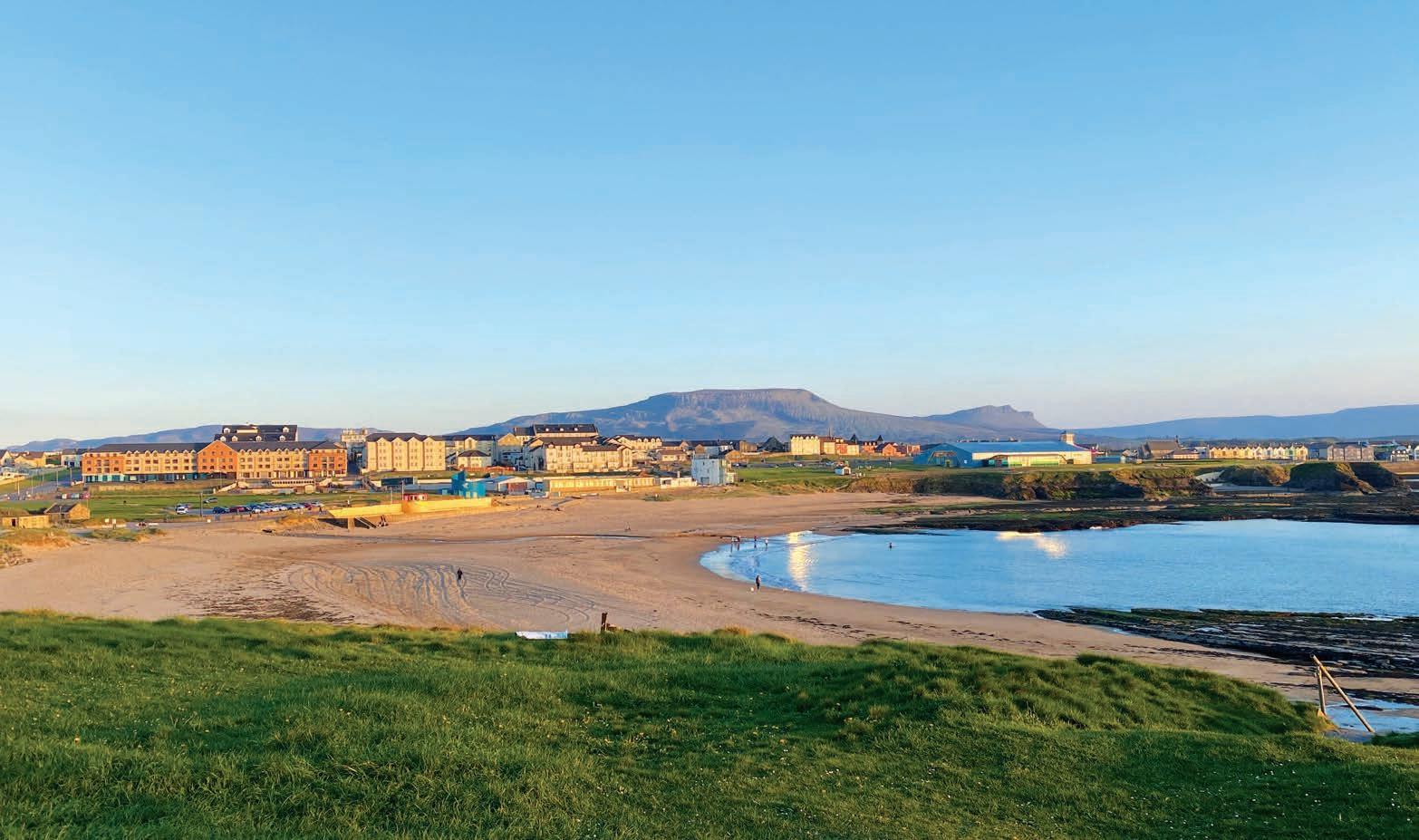


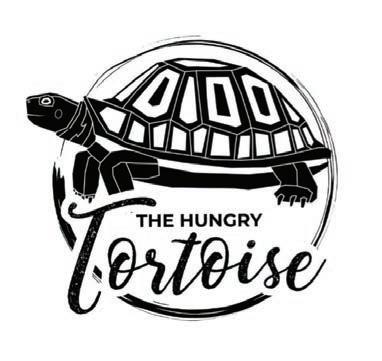
Discover the wonders of
Secret Valley Wildlife Park o ers 14 acres of education, adventure and fun for all the family. Secret Valley has now been open to the public fteen years and over theoe years has seen alot of changes, hard years and major rewards. e newest addition to Secret Valleys amenities is the opening of the Hungry Tortoise Cafe/ restaurant where you can call in for a bite to eat now without paying to enter the park. You can ne the cafe o our new car park and entrance. e menu contains something for everyone from all day breakfasts, light lunches, crepes, pancakes to sweet treats, soft scoop ice-cream and great co ee. Call in from 9 to 6 everyday and our friendly sta will be happy to look after you, e park has loads to o er visitors of all ages, from feeding a baby goat, hand feeding our llamas and alpacas, meeting Toby the tortoise, joining in with our keeper talks. With an indoor and outdoor playarea, quad train, adventure hunt there’s is plenty to do for all the family and thats before you see our wide variety of animals. Secret Valley has 38 species of animals including. Meerkats, lemurs, monkeys, porcupines and capybaras. We also work with AAP rescue centre in Denmark, giving long term care to exploited primates from the pet trade and laboratories in need of a happy home
Education is a big part of what secret valley is about and we provide ecology sessions for both junior and leaving cert students as well as team building days for Ty and none exam years, We also provide a fun lled day for primary school students.
Looking to the future the Sv team have a lot of plans to enhance the park, these change will be on going over the summer and next year, watch this space as there is alot to happen at Secret Valley Wildlife Park So if you are looking for things to do in Wexford why not come and pay us a visit - you would be most welcome!



CAP that! Ceremony marks 60 years of common farm policy
Six decades after its enactment the Common Agricultural Policy (CAP) is key to Europe’s e ort to tackle the current global food crisis. at is the view of Ireland South MEP Deirdre Clune, as the European Parliament marks the 60th Anniversary of the reformative CAP.
A special ceremony recently highlighted the 1962 CAP agreement designed to guarantee a ordable, safe and high quality food.
MEP Deirdre Clune told e Kilkenny Observer: “Accounting for a third of the EU’s total budget, the Common Agricultural Policy (CAP) currently provides food for 447 million citizens and supports around 120,000 Irish family farms.
“Enacted following years of war and famine in Europe, CAP has made the EU largely self-su cient in key agricultural products, but we are now facing the challenge of global shortages and soaring commodity prices,” she said. e South East MEP said the war in Ukraine had added further disruption to agricultural markets already under pressure from the Covid-19 pandemic and climate change.
“CAP reforms, which are due to start next year, can help food producers become more e ective, results driven, and environmentally friendly.
“Small businesses and young farmers will be prioritised, with more incentives for low carbon agriculture along with greater exibility in planning,” ms Clune said.
As it continues to evolve, the Common Agricultural Policy remains key to providing food for Europe and tackling the current shortages facing the wider world.”
Arts Council announces over €47m. in funding

e Arts Council, the Irish government agency for developing the arts, is pleased to announce its strategic funding decisions for 2022. Funding totalling €47.4million will be distributed to 106 organisations across all parts of the country.
From theatre to Irish traditional arts, from jazz to classical music to local ddle festivals, from visual arts to literature, the talent and creativity embodied in these organisations is world class, full of ambitious con dence and something that we should all be proud of.
Maureen Kennelly, Director of the Arts Council, said: “Our strategic funding decisions will enable people of all ages and from all backgrounds to experience the very best of the arts.
“ e recipient organisations range across galleries, festivals, choirs, publishers, studios, theatres and venues and their work will ensure that the public has access to high quality artistic expression in every part of Ireland.”
Chair of the Arts Council, Prof. Kevin Rafter, said: “Receiving funding of €130m for 2022 has allowed the Arts Council to invest in arts organisations across the country.
“ is funding for 106 organisations means local communities all over Ireland will be able to access great art throughout the year,” according to Prof. Rafter.
Recipients of strategic funding play a critical part in delivering the policy priorities of Making Great Art Work, the Arts Council’s strategy for the past 10 years. ey also support the essential infrastructure required to sustain and develop the arts in Ireland. Funding is awarded following an open and competitive application process. e criteria against which applications are assessed are; artistic quality and development of the arts, public Engagement, organisational capacity, the importance of the organisation in the arts infrastructure and the commitment to Equality Diversity and Inclusion.
Our strategically funded organisations deliver excellent artwork and / or events and provide excellent opportunities for artists to develop their practice or to be engaged in high-quality, creative work.
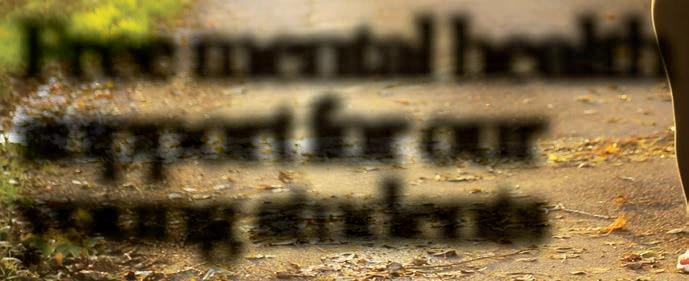
Ploughing champs in accommodation crisis
Organisers of the National and World Ploughing Championships are appealing to home and property owners to give them a dig out as all available accommodation close to this year’s venue is already booked up.
Both the National and 67th World Ploughing Championships are being held at Ratheniska, Co Laois, from September 20 to 22.
More than 300,000 people are expected to attend this year’s mammoth event along with exhibitors and competitors, when Ireland will welcome ploughing teams and their supporters from 24 countries. e National Ploughing Championships is the largest outdoor event in Europe and, due to the pandemic, it will be the rst time in three years that it is taking place.
Accommodation availability is already under pressure due to the World Ploughing Championships being moved from Russia to Laois only two months ago.
Accommodation in nearby Kildare, Carlow, Kilkenny and Tullamore is already fully booked, according to Championships organiser Anna Marie McHugh.
Free mental health support for our young students
Turn2Me, a national mental health charity, has launched a free mental health support group, up and running now. e ‘Exam Stress’ support group is open to students of all ages and will cater for young people sitting the Leaving Certi cate, students preparing for college entrance exams, and students doing third level exams. e support group is free for all students and is also open to parents who are worried about their children during exam season. e support group focuses on exam anxiety, how to reduce exam stresses, and how to prepare for upcoming exams while ensuring your mental health is also prioritised.
e free support group is conducted by a mental health professional, Anika Sparling, who is a quali ed, accredited psychotherapist. e support groups are accessible to anyone on the island of Ireland. People who want to enrol for the free ‘Exam Stress’ support group can create a free account on Turn2Me.ie and simply sign up for the group. “We are delighted to launch this vital support group for students,” Fiona O’Malley, CEO of Turn2Me, said, “We have been listening to our users and to feedback from secondary schools and third level institutions across the country, and the need for this support group has become clear to us. A little bit of stress coming up to exams can be good, as it can help you focus and act as a motivation tool. e problems occur when the anxiety and stress levels increase and become overwhelming.
“Some students feel like they’re drowning in the pressures they put on themselves, or pressures from their parents, to perform well in exams. Of course, it’s important to try your best in exams, but academic success isn’t the most important thing.
“ e most important thing is to manage your wellbeing and to make sure that you’re approaching exams with as little stress as possible, one topic and one subject at a time,” Fiona O’Malley said. “ e common symptoms of stress coming up to exams are feeling low, appetite loss, feeling overwhelmed by the pressure, not being able to sleep, and sometimes not being able to focus,” Anika Sparling, a psychotherapist at Turn2Me said. “ is level of stress is unproductive and unhelpful because it’s bad for your mental health and it also negatively impacts your performance during the exams. e support group we’re launching on Exam Stress will run every ursday at 6pm on the Turn2Me website. People can anonymously post how they’re feeling and voice their concerns.”
Thomastown Arts fest back in full swing
e omastown Creative Arts Festival (TCAF) is back in full swing for 2022 and welcomes audiences to gather and celebrate great art on show in venues in and around omastown from the August 5 to 14. is year’s festival will feature an array of both local creators and nationally recognised artists. Working in a variety of both traditional and non-traditional media this diverse list will present their work in various locations. is year’s festival will celebrate our capacity to gather again through an inclusive, family friendly programme of exhibitions and installations.
Some artists and groups exhibiting at this year’s festival include:
Grennan Mill Craft School will host an exhibition of graduates and tutors from the past 40 years including Peter Donovan, Anne-Marie Reinhold, Orla Kaminska and many more. Natural Traces will be on display at Jerpoint Glass showing the work of Stephen Vaughn & Jane Jermyn and the Watergarden will feature Nano Nature, the ceramics of Sonja Guenther. Grennan Mill will host e Secret Garden exhibition and both the omastown Community Centre and omastown Men’s Shed will host multiple artistic exhibitions.
Performing as an everchanging living work of art, omastown Biodiversity Garden will be open to the public throughout the festival and will also play host to an exhibition of sculpture by Brendan Dooley. e omastown Creative Arts Festival is producing a full colour brochure to advertise artists exhibiting in omastown. ere is no fee for participating artists.
Businesses adverts of 105x99mm are available for purchase.





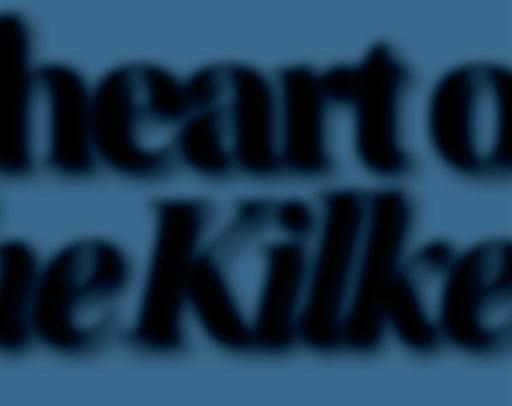

The annual Fr. McGrath ‘Fáilte Isteach’ English Awards, were presented on Wednesday May 25th. This year’s presentation was made by Mayor Andrew McGuinness. The event was attended by an eclectic mix from around the globe – diverse cultures from Africa, Asia, South America and Europe all gathered together, each with their own story to tell. The Kilkenny Observer was happy to attend and capture the moment.


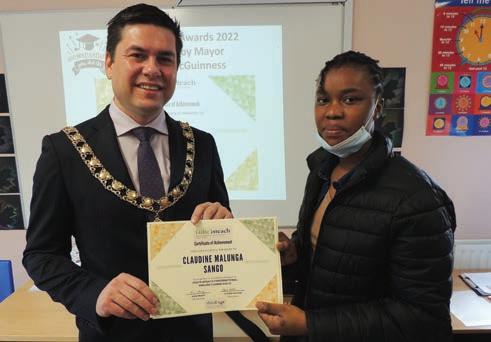
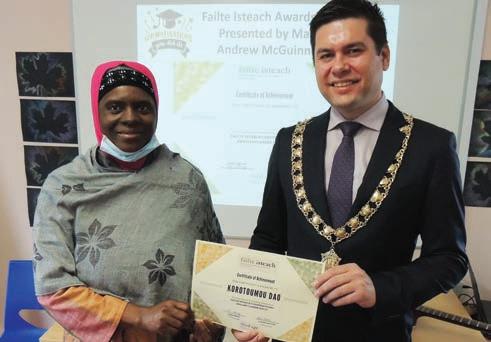
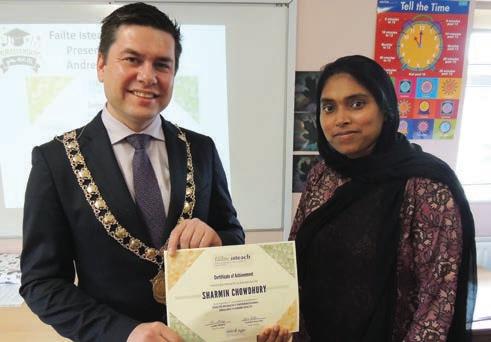

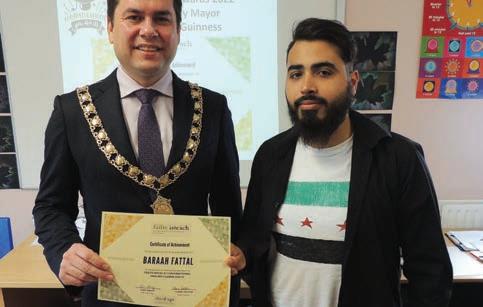
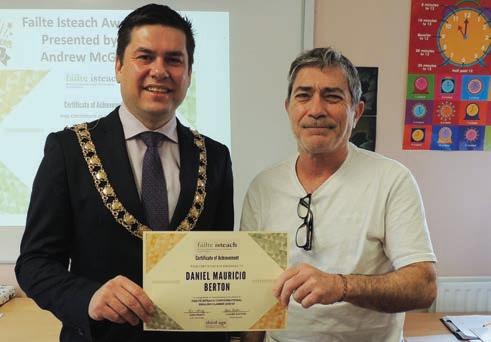


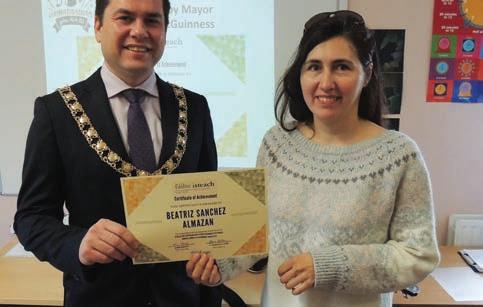

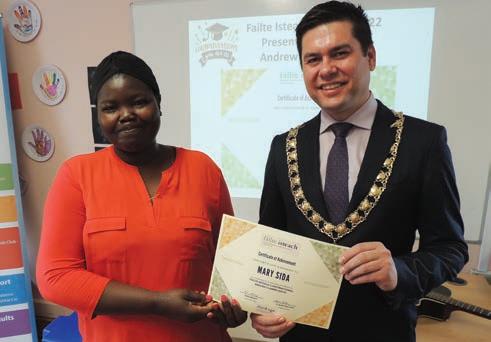
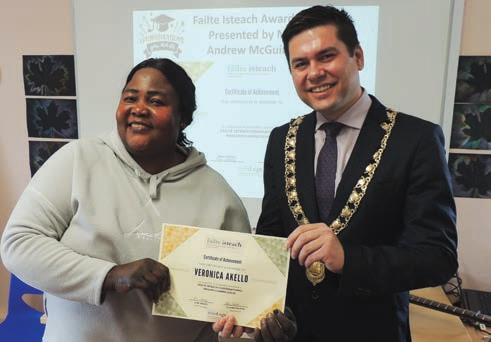



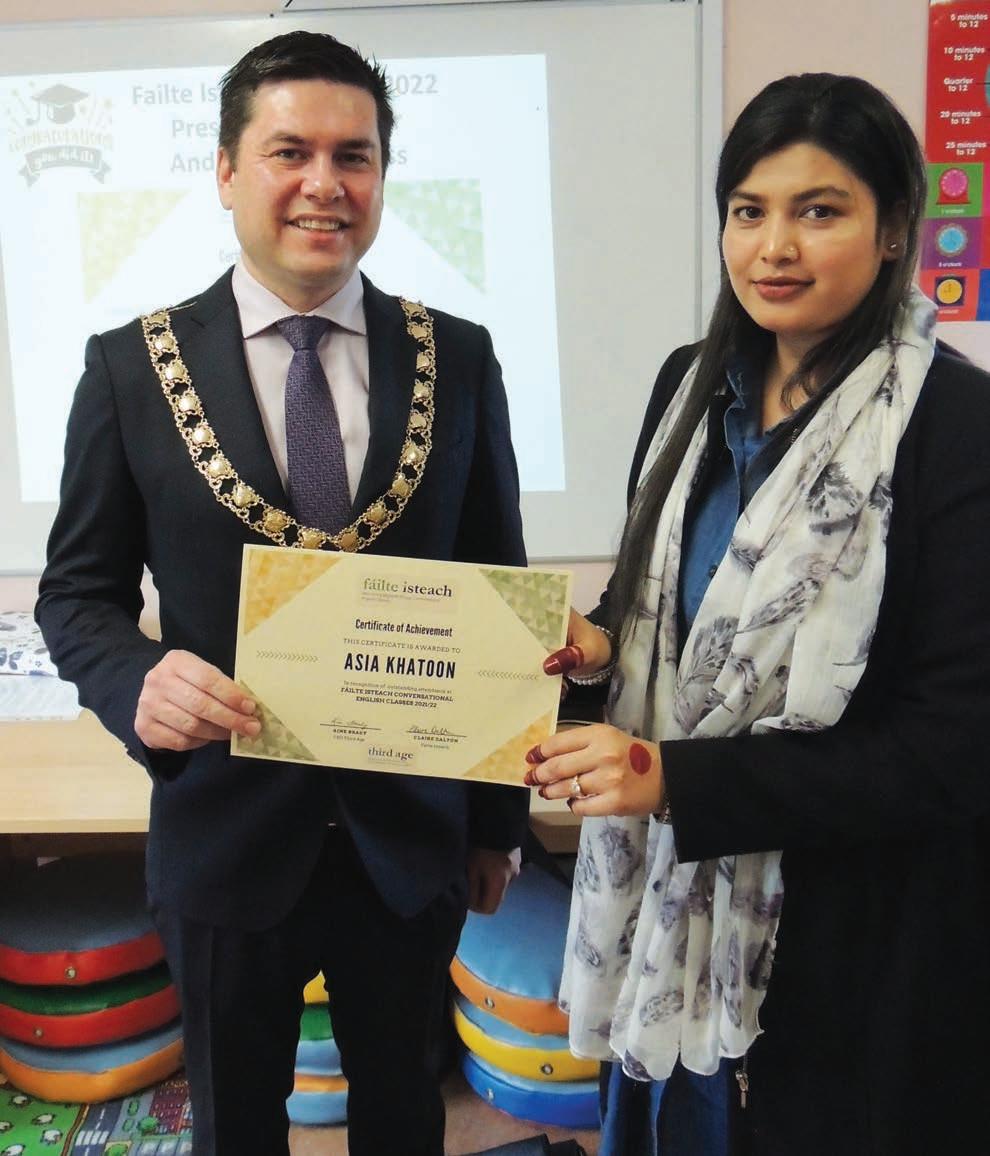
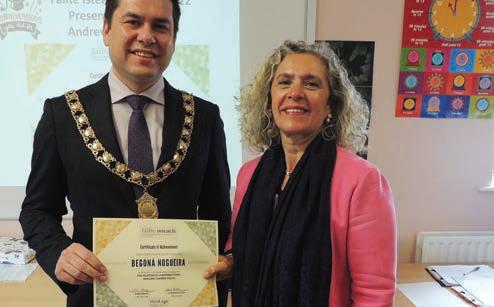

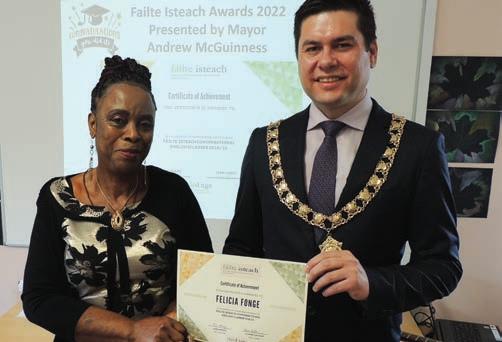







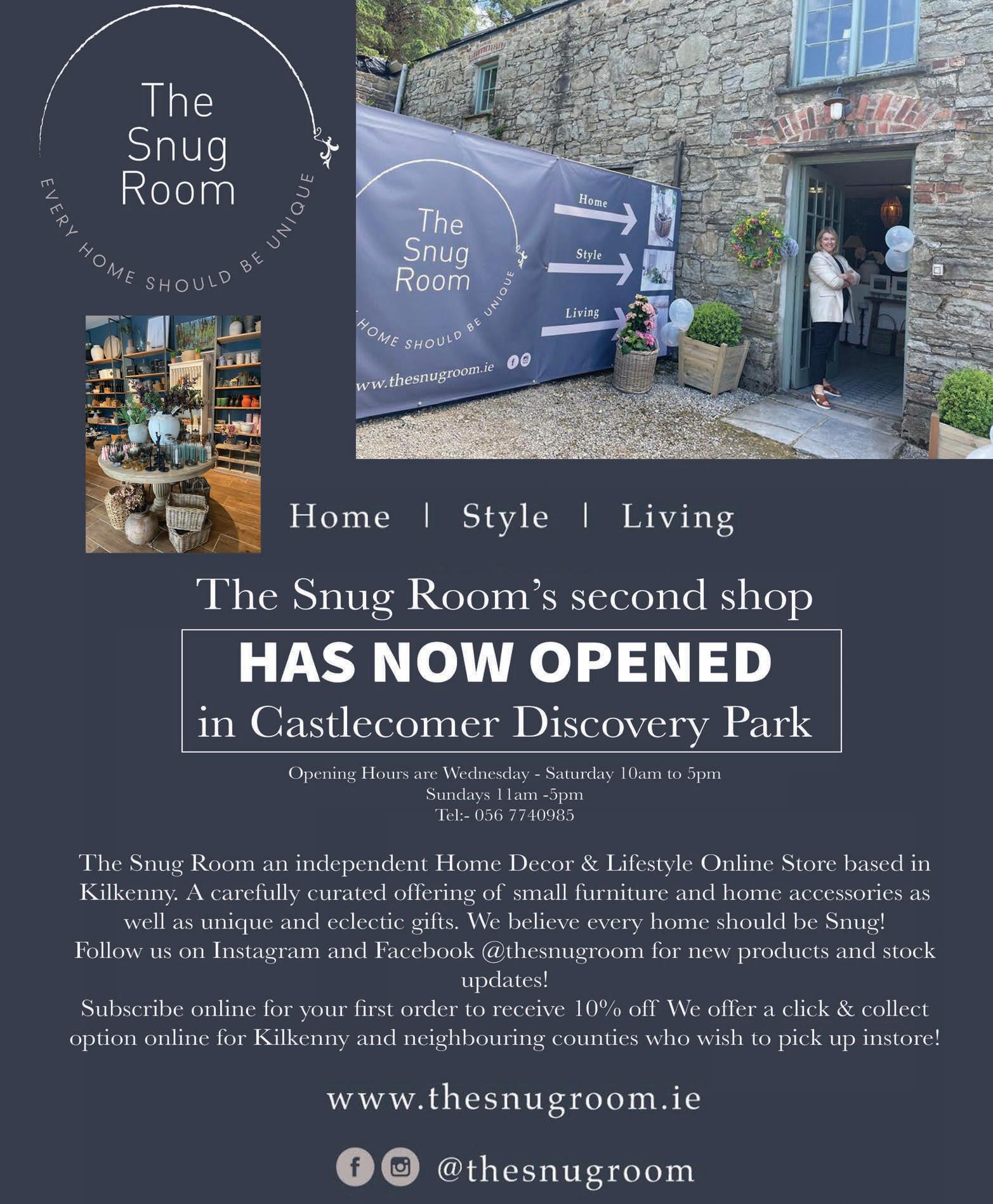
From Barrack Street in Kilkenny, James Frederick Plunkett saw action in some bitter battles
is week, e Kilkenny Observer looks at the life Of Lieutenant Colonel James Frederick Plunkett, born into a Kilkenny military family, and who was to see war at rst hand in many parts of the world. is is part one of a two part series
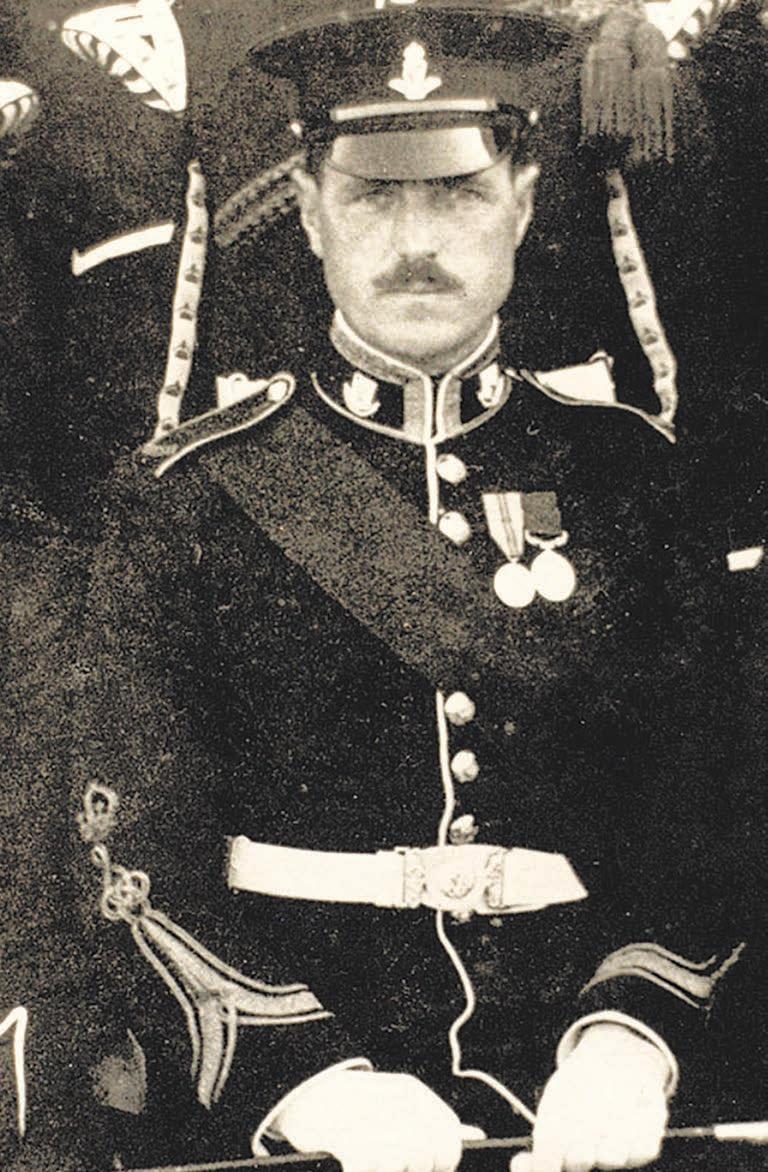
A soldier, man and boy
James Plunkett was born into a military family in Kilkenny, Ireland, on 9th January 1878 (son of John Plunkett (soldier) & Amelia (nee Williams), Barrack St., Kilkenny. Aged just 13, he ran away from home and joined 2nd Battalion e Royal Irish Regiment as a band-boy.
Army life clearly agreed with him, and he took advantage of its many sporting opportunities. As well as enjoying cricket and billiards, he became a skilled marksman and an accomplished footballer.
By the outbreak of the First World War (1914-18), Plunkett had already served 23 years and risen to become a regimental sergeant major. He saw action on the Western Front throughout the con ict, taking part in some of its most bitter battles.
He recorded his experiences in a rough diary, from which he later wrote up a fascinating memoir. is not only details his incredible story, but also provides valuable insights into the nature of trench warfare.
Retreat from Mons
Plunkett arrived in France with his battalion on 14 August 1914. As part of the British Expeditionary Force (BEF), the men immediately advanced into Belgium to meet the German invasion head-on.
As they marched, the British were welcomed everywhere by the local people and Plunkett later described this opening phase as a ‘glorious picnic’. is mood was soon shattered by their rst encounter with the enemy. e battalion played its full part in a famous action at Mons in which the BEF checked the German advance, though at a heavy cost of life.
Following this baptism of re, the battalion - along with the rest of the BEF - had to endure a demoralising retreat, punctuated by a series of desperate rearguard actions. e defence of the village of Audencourt proved particularly harrowing, with Plunkett astonished that any of his comrades came out alive.
Needless to say, the British su ered many casualties during this period. Among them was Plunkett’s own brother, who was wounded and taken prisoner.
‘However anybody in Audencourt that day escaped being killed or wounded remains a miracle to me. I have never witnessed to date anything like the shell, machine gun and ri e re we were under there… It was a pitiful sight along the road from the village to about ½ mile to the rear, to see the wounded lying by the roadside, many torn by shell, with nothing but death or capture by the enemy awaiting them.’
James Plunkett on the ghting at Audencourt, 1914
Tragedy at Le Pilly
e gruelling retreat came to an end on 6 September 1914 and Plunkett recorded the enthusiasm with which the men received their orders to advance. e Royal Irish Regiment now took part in the grand counterattack that unfolded, known as the Battle of the Marne. is culminated in a bloody check on the River Aisne and was, in turn, followed by a series of anking battles and manoeuvres known to posterity as the ‘Race to the Sea’.
At the Battle of La Bassee (1920 October), Plunkett’s battalion undertook a desperate attack on the village of Le Pilly. e men captured their objective at heavy cost, only to nd themselves in an isolated and impossible position, facing a powerful German counterattack. En laded and overrun, the unit was almost entirely wiped out.
At this time, Plunkett oversaw the battalion’s horsedrawn ammunition carts and so was fortunate not to be in the front line. Unable to get through to his comrades, he later recalled how the ‘the groans and moaning in the trenches of our wounded was terrible, it being impossible to get near them to render even rst aid as the surrounding ground was swept by re’.
Plunkett found himself to be one of the most senior of the handful of survivors. Soon afterwards, the remnants of the battalion were pulled out of the line so that it could be reconstituted.
‘I cannot give an estimate of the casualties, amongst the rank and le, but should image that all, with the exception of the transport, were either killed or captured.’
Captain Michael Harrison, 2nd Battalion, the Royal Irish Regiment, recounting the action at Le Pilly, 1917
A double award for gallantry
Plunkett undertook many heroic actions during this opening phase of the war. ese included helping to rescue his wounded commanding o cer, Lieutenant Colonel St John Augustus Cox, during the retreat from Audencourt and clearing a dead horse from a pontoon bridge at Vailly, on the Aisne, while under heavy re.
He was honoured with the Distinguished Conduct Medal and became one the rst recipients of the newly established Military Cross.
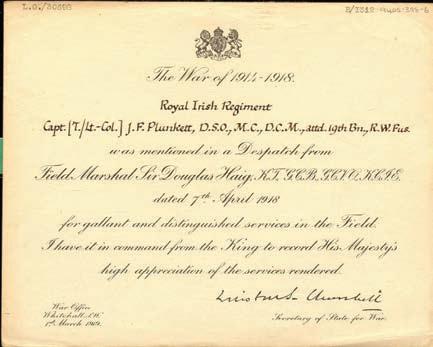
Certificate attesting one of James Plunkett’s five mentions in despatches, 1918
ern Front with his battalion in March 1915, serving in the Ypres sector until June. Here, the Germans pioneered a terrible new weapon - poison gas.
Gas could in ict terrible injuries and sow terror in the ranks. A particularly nasty experience came in the early hours of 24 May at Bellewaarde Ridge, when the Germans unleashed a deluge lasting over ve hours as the prelude to a major attack. e gas engulfed the British line. Many men, including those of 2nd Royal Irish, were driven into headlong retreat. Plunkett himself was rendered unconscious, but was luckily found and revived by two of cers.
Realising that the retreat countermanded a recent order prohibiting withdrawals in the face of gas attacks, Plunkett and a few others immediately attempted to rally the men, though with little success. While the attack was eventually halted, the Germans had in icted severe losses upon the regiment. Casualties included its commander, Lieutenant Colonel Redmond Moriarty. e withdrawal was the subject of a regimental enquiry in which Plunkett was obliged to give evidence. Although he remained convinced that soldiers could withstand gas attacks, he was later to write of the persistent di culties involved in maintaining discipline in the face of this cruel and insidious weapon.
‘My own experience through many gas attacks has proved to me, even when not wearing a mask, that the individual can, in most cases, overcome the e ect without going back.’
Plunkett on poison gas.
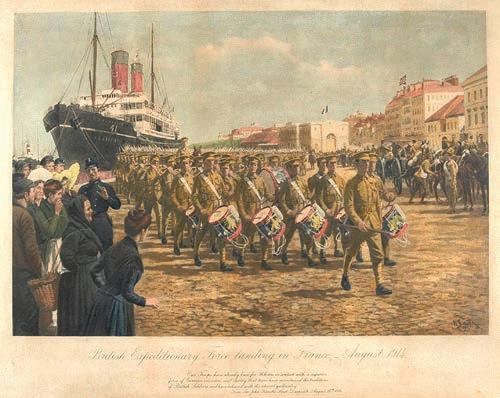
Sergeant Major James Frederick Plunkett , 2nd Royal Irish Battalion ( 1910
Next week Part two.


Kilkenny’s Golden Age

In that Golden Age of the Confederation VIPs were received in the City with great pomp and pageantry. Triumphal arches were built. Great processions under the arch became common, to celebrate Confederate victories on the battle eld or the arrival of important foreign dignitaries. ese grandiose scenes recalled the glory days of ancient Rome.
After Eoghan Rua O’ Neill’s victory at the Battle of Benburb in 1646, troops paraded through the streets bearing captured enemy standards. Marching alongside them were high-ranking clergy, merchants and other pillars of society… all holding lighted candles or torches. Bon res and artillery barrages rounded o the festivities.
But the most magni cent and high pro le reception was reserved, in 1645, for the arrival in Kilkenny of the Papal Nuncio, Archbishop Rinuccini. He was Archbishop of Fermo and Ambassador of the Papal States and about to become a powerful though ultimately unhelpful ally of the Confederation. In the short term, his presence in the City would achieve international respectability for the Confederacy.
A group of prominent city folk, mainly scholars, met him three miles from Kilkenny. ese notables read a specially composed oration in his honour. He loved the eloquent verses that the poetically minded group recited. St. Patrick’s Church was fronted by a huge gathering of top-notch clerics…all anxious to greet one of God’s chosen representatives on earth; a man they hoped could help the Confederacy win its aim of a united Catholic Ireland.
All the members of the Corporation turned out at St. Patrick’s gate to extend a formal welcome to the Archbishop. From here he was mounted on Kilkenny’s nest black stallion. His multicoloured ponti cal cape and hat wooed the crowds of cheering onlookers. Along with his military escort, he proceeded on horseback towards St. Canice’s Cathedral. e entire route was lined by Confederate troops, standing to attention and bearing muskets. Trumpets blared and drums beat in triumph. Confederate banners uttered across the length and breadth of the city. It was one of the proudest moments in the history of Kilkenny.
When the Archbishop of Fermo reached Market Cross in the middle of the city he halted momentarily amidst a teeming crowd of well wishers to acknowledge their warm welcome and frenzied cheering. People surged forward from all directions in an e ort to touch his cloak, believing it had divine or magical powers. Stewards called for silence and a young man, having ascended the steps of the Market Cross-, chanted a moving oration to the “Pope’s Man in Ireland”.
At St. Canice’s, Dr. David Rothe, Bishop of Ossory, greeted Rinuccini. Clad in special vestments for the occasion, Dr. Rothe presented the Papal Nuncio with a vessel of holy water and incense. He guided his distinguished guest to the High Altar in the Cathedral from where further tributes were paid to the man from Rome.
But Kilkenny’s Golden Age was not to last beyond the 1640s. With Civil War raging in England, the Confederates deemed King Charles I and his Royalist forces to be the lesser of two evils. e Twelfth Earl of Ormonde, James Butler, acting for the king, had already negotiated a one yeartruce between the Confederate army and the Crown.
Archbishop Rinuccini perceived any compromise on the issue of supreme Catholic domination of Ireland as a betrayal of the Irish cause and an a ront to God. He returned disillusioned to Rome.











